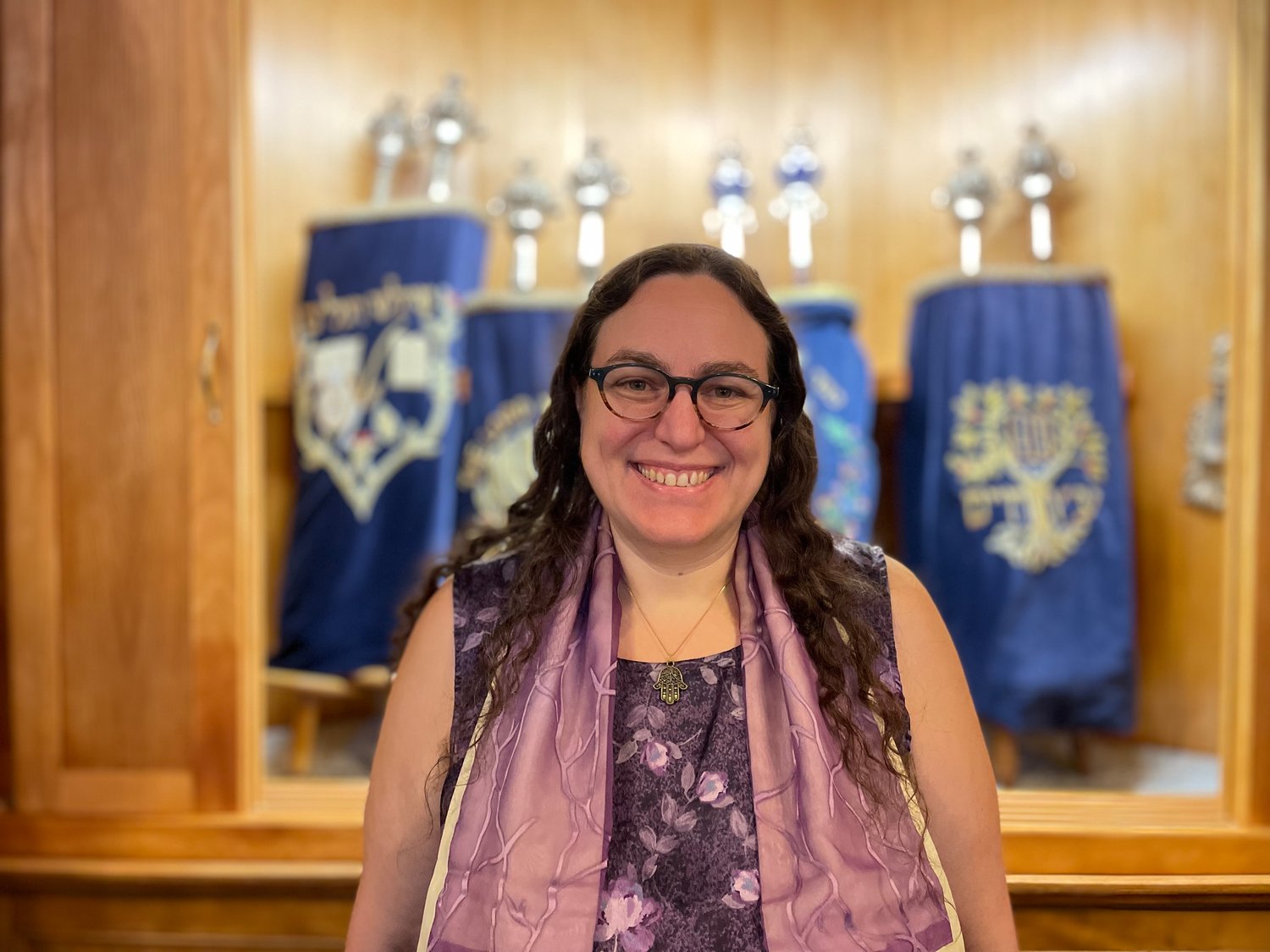A good fit: Rabbi Shalem and Agudas Achim
Rabbi Talya Weisbard Shalem has an impressive collection of kippot. In addition to the rainbow one she wore during a recent interview, she brought along three others that matched her purple dress.
“This one is kind of fun,” she said as she tried on a purple kippah. “I enjoy this one.”
Shalem became the rabbi at Congregation Agudas Achim, a Reconstructionist temple in North Attleboro, Massachusetts, in July. She has been involved in the Jewish world for years; in addition to being a rabbi, she is an educator, a community organizer and the co-founder of a Reconstructionist summer camp in South Sterling, Pennsylvania. Her career outside of Judaism has taken her from an undergraduate degree in anthropology from Harvard to working for the Census and training as a data analyst.
Growing up in New Jersey, Washington, D.C. and Wisconsin, Shalem was immersed in Judaism.
“My parents are both very involved in the Jewish community, both personally and professionally,” she said. “They were part of the havurah movement, which is kind of this DIY, you know, very feminist movement. They wrote their own creative feminist Jewish wedding ceremony and wrote a creative baby-naming ceremony for me.”
When Shalem’s family joined a synagogue, it was Reconstructionist.
“I was around 3 or 4, and we had a woman rabbi there, and apparently when I was that age, I asked if boys could become rabbis too,” Shalem said with a laugh.
“I went to Harvard for college and was in the Conservative minyan, and the Conservative minyan at the time [1996] had a rule that if you were leading services, you could not include the Imahot, the four [founding] mothers, in the Amidah, [it] was not allowed,” she said. “And this was wild to me. I think Imahot only came into published prayer books in the 1990s, but it had been in individual congregational prayer books – photocopied things or handwritten things – my whole life. And just the idea that you couldn’t do it as the leader was so annoying.”
Harking back to her childhood in the havurah movement, Rabbi Shalem founded a Reconstructionist havurah at Harvard Hillel that met for havdalah.
“In college, I really enjoyed running the havurah and being a spiritual leader,” she said.
In her college application essays, Shalem wrote that she wanted to be a lawyer, an academic or a rabbi. Once in college, she found herself pulled between the debate team and Hillel, and more often than not found herself attending services rather than leaving campus to debate. The choice was made.
As part of the havurah movement, Shalem had spent summers at national havurot institutes, where many people were faculty at the Reconstructionist Rabbinical College, in Wyncote, Pennsylvania, where she applied to rabbinical school.
“I knew it was a warm, nice community where people got mentored,” Shalem said.
While visiting the school, she attended a launch party for a student who had published a book of children’s plays, while another student had put out a CD of meditative Jewish music.
“I saw the community celebrating her [the writer], and I was like, this is a really cool place where people are celebrated for their different, creative ways of being Jewish,” she said.
Shalem also found that her feminism was a good fit with the Reconstructionist movement.
“Reconstructionism rejects chosenness, which aligned well with me. I always found that kind of a troubling concept,” she said.
As a rabbi, Shalem said she enjoys working with multigenerational families and the varied nature of her days, which might include meeting congregants, planning a funeral or leading services.
“I enjoy being able to use my toolbox to help people,” she said. “I have a toolbox that’s mostly Jewish things, but also some other world wisdom, and I try to meet whoever comes my way with whatever I can use to help them.”
Shalem described the Congregation Agudas Achim community as warm and caring.
“People have stayed here for a long time, and built really deep friendships and connections across multiple generations,” she said. “If I ask questions in services, people have really thoughtful and interesting things to say. I like working in communities where we can engage in a back-and-forth.”
When asked about her favorite part of being a rabbi, Shalem responded, “Oy, it feels cliché, but I actually really like weddings. What I tell the couple is, I think marriage is really hard for everyone, and what I want to do is everything I can to throw glue at you, that is what I’m doing.
“Me and the community of your families, and whatever religious traditions they come from, [are here] to help you and strengthen you and be there to support you however we can.”
SARAH GREENLEAF (sgreenleaf@jewishallianceri.org) is the digital marketing specialist for the Jewish Alliance of Greater Rhode Island and writes for Jewish Rhode Island.








